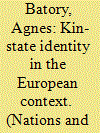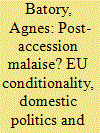| Srl | Item |
| 1 |
ID:
095083


|
|
|
|
|
| Publication |
2010.
|
| Summary/Abstract |
The broad objective of this article is to explore the interaction between nationalism and Europeanisation, and the impact of this interaction on constitutionalism at the level of EU member states, using Hungary as a case study. The country reasserted its identity as a kin-state after regime change in 1990, with the relationship between ethnicity/national identity and political community repeatedly taking centre stage in political life and in the field of citizenship legislation. At the same time, the country actively pursued integration into the EU, including a constitutional amendment allowing accession. Despite the potential implications of joining a supranational political entity for the definition of political community, the two parallel processes remained largely disconnected in the political discourse and the broader debate on constitutionalism in the EU has found less resonance in domestic politics than controversy over citizenship and national identity.
|
|
|
|
|
|
|
|
|
|
|
|
|
|
|
|
| 2 |
ID:
095016


|
|
|
|
|
| Publication |
2010.
|
| Summary/Abstract |
Corruption in the then candidate countries of Central and Eastern Europe was a major concern for the European Union (EU) before its 2004 enlargement. This concern and its expression in the conditionality of membership constituted strong incentives for the candidate countries' governments to control corruption - or more precisely to take control measures that could be communicated to the European Union. A common assumption in the literature is that with the removal by accession of these incentives anti-corruption efforts would not be maintained at their pre-accession level. But is this really the case? Or have other influences from international organisations, domestic politics or civil society taken over to provide impetus for further corruption control interventions? This article considers these questions with respect to Hungary and finds that while some of the post-2004 measures have been a response to the country's international commitments, there have also been important domestic sources of reform. The results are, however, limited: despite the country's relatively smooth path to the European Union, membership of all the major international legal instruments and three major reform packages since 2000, corruption seems no less prevalent than it was a decade before.
|
|
|
|
|
|
|
|
|
|
|
|
|
|
|
|